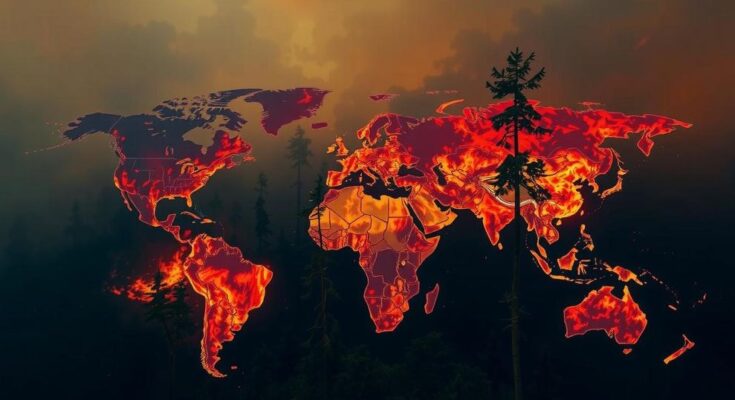Recent research demonstrates a direct correlation between climate change and the rising incidence and severity of wildfires globally, leading to increased smoke-related mortality rates. Studies reveal significant regional differences, with various ecosystems responding differently to human and climate influences, emphasizing the urgent need for effective strategies to address these escalating challenges.
Research has unveiled a critical connection between climate change and the escalating frequency and intensity of wildfires globally, while also linking this phenomenon to a concerning increase in smoke-related fatalities over recent decades. Two separate studies carried out by research teams from Dalhousie University in Canada, along with institutions in Belgium, the United Kingdom, and Japan, have provided alarming insights into the intensifying effects of wildfires on both the environment and human health. The research indicates that annual smoke-related deaths attributed to wildfires have surged from fewer than 669 annually in the 1960s to approximately 12,566 by the 2010s. One of the studies, published in “Nature Climate Change,” thoroughly assessed wildfire models with respect to climate change, revealing a significant uptick in wildfire occurrences and intensities, particularly in vulnerable ecosystems such as the African savannas, Australia, and Siberia. Notably, the study identified stark regional disparities: although Africa, which hosts around 70 percent of the world’s burnt areas, witnessed a substantial decline in wildfires—primarily due to increased human activity and fragmented landscapes—regions such as California and Siberia experienced a rise in fires, linked to prolonged droughts and higher temperatures caused by climate change. Dr. Sian Kou-Giesbrecht, an associate professor at Dalhousie University’s Department of Earth and Environmental Sciences, noted, “The study is important because it shows and quantifies the influence of climate change on increasing wildfires worldwide, especially given the impacts of wildfire on society and its feedback to climate change.” The research teams utilized models that incorporated various factors, including climate, vegetation, and population density. They found that while human intervention strategies like fire suppression could mitigate wildfire impacts, these efforts were often insufficient to counterbalance the more significant repercussions of climate change, particularly during severe fire seasons. Seppe Lampe, a climate scientist at the Vrije Universiteit Brussel and a lead author of the study, remarked, “What is striking is that in periods with low to moderate numbers of fires, direct human interventions have a large effect. However, in periods with many fires, the effect of climate change dominates, meaning that in these cases, we lose control.” The simulations revealed that climate change contributed to a nearly 16 percent increase in the global burned area between 2003 and 2019 and raised the likelihood of experiencing months with above-average burned areas by 22 percent. The paper concluded with a call for immediate and substantial reductions in greenhouse gas emissions and effective landscape and fire management strategies to stabilize the outcomes of wildfires on communities and ecosystems. In a separate study published simultaneously, researchers discovered that climate change has potentially increased wildfire smoke-related mortality rates by tenfold over the past fifty years. This research, which involved collaboration with the National Institute for Environmental Studies in Japan, evaluated fire and vegetation models alongside a health risk assessment framework to determine the role of climate change in global mortality caused by wildfire smoke from 1960 to 2019. They found that the proportion of fire-related deaths attributed to climate change rose from between 1 to 3 percent in the 1960s to as high as 28 percent in the 2010s, with regions such as South America, Australia, Europe, and the boreal forests of Asia bearing the brunt of these fatalities. Dr. Kou-Giesbrecht emphasized the complexities of attributing wildfires to climate change, stating, “It can be tricky to attribute wildfire to climate change because of the complexities of the interactions between fire weather, global change effects on potential fuel, land management, and ignitions, but in these international projects, we have made a robust attribution of wildfires to climate change using multiple models.” Should the current trajectory of climate change persist, the projected increase in burned land and subsequent health repercussions is a grave concern that merits immediate attention.
The article discusses the alarming trends regarding wildfires and their connection to climate change, presenting research findings that highlight both environmental and health implications. The studies illustrate varying regional impacts of wildfires while underscoring the increasing dangers posed by climate change alongside human interventions.
The findings from the studies reveal a troubling trend in wildfire frequency and intensity worldwide, directly correlated with climate change, leading to a significant rise in smoke-related deaths over the decades. Comprehensive strategies that combine greenhouse gas emission reductions with effective fire management practices are essential to mitigate the detrimental effects of wildfires on both the planet and public health. Failure to act on these insights may exacerbate the adverse consequences in the future.
Original Source: www.dal.ca




